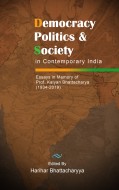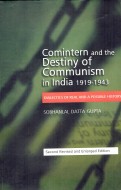Search results for 'north face'
-

Democracy, Politics and Society in Contemporary India
Author: Edited by Professor Harihar Bhattacharyya, PhD (LSE)
₹700.00More people live with electoral democracy in India than in Europe and the US combined. If we are to understand democracy as a form of government, with its successes and failures, its ability to create peace and development or its ability to falter, create division and give rise to majoritarianism, authoritarian leaders or identitarian movements, we need to understand democracy in India. This intellectually engaging collection of articles is a valued contribution to this endeavour because it challenges us to investigate democracy as an ongoing process, its final goal never defined. The collection has profound lessons not just for understanding India’s democracy but for democracy, political legitimacy and societal capacity world-wide. Arild Engelsen Ruud University of Oslo Contents Preface and acknowledgments List of Tables List of Figures Notes on Contributors Harihar Bhattacharyya: Introduction: Democracy, More Questions, Few Answers Chapter 1 Subrata K Mitra: Citizenship in India: the puzzling resilience of an imported concept Chapter 2 Sudipta Kaviraj: Two Concepts of Democracy and the Left in West Bengal Chapter 3 Sobhanlal Datta Gupta: Revisioning the Left in today's India : Towards an alternative understanding Chapter 4 Surajit Ch. Mukhopadhyay: The Right and the Left: Contemporary India and the crises in Indian Democracy Chapter 5 Kaushik Bhattacharya: Independent Candidates in Lok Sabha Elections Chapter 6 Sumantra Bhattacharya: Political Marketing in India: How Political Parties in India Make Use of the Marketing Tools Chapter 7 Sukanta Bhattacharyya: Limits of Positive Discrimination in India’s Localities: Does it signal a failure of India’s Democracy? Chapter 8 Bibhas Bagchi: For a Radical Democracy: Understanding and Contesting Hierarchies in India Chapter 9 Syeda Layla Khaled: Muslim Women in India: Between Democratic Citizenship and Muslim Identity Chapter 10 Abhisek Karmakar: The Making of India’s Democracy Discourse: Contributions of Dwarakanath Vidyabhusan Chapter 11 Sahon Bhattacharyya:Reappraising the value of the traditional: Indian social ontology beyond the Western episteme Chapter 12 Joyjit Ghosh: Symptomatic Politics, Asymptomatic Media in India Chapter 13 Harihar Bhattacharyya: Indian Democracy’s Civil and Political Society: A critique of Partha Chatterjee Appendices 1. Jyotirmay Bhattacharya: A short Biography of late Kalyan K Bhattacharya 2. Kalyani Bhattacharyya: Kalyan Bhattacharya: A Reminiscence 3. Writings of Kalyan Bhattacharyya: (re-reprinted) a. Sociology of Inequalities: Bankim Chandra’s Essay on Samya (1992) (pp. 85-107) Journal of Socio-Political Studies, Vol 1, 1992. b. Bhudev and Modernity: Nationalism and Beyond (2007) (pp. 30-45) Index Learn More -

RE READING RAMMOHUN ROY: A TWENTIETH CENTURY PERSPECTIVEE
Author: Editor: Partha Pratim Basu
₹200.00CONTENTS 1. RadharamanChakrabarty : Re-Visiting the Raja. 2. SobhanlalDatta Gupta, Rammohun Roy and his Quest for Modernity: Revisiting his Interpreters 3. ParthaPratimBasu, Rammohun Roy: A Path breaking Inquiry into the Colonial Economy 4. ShibashisChatterjee and RudrasekharBasu, The Domestic and the ‘Global’: The Dual Registers of Rammohun’s Liberalism 5. ImankalyanLahiri and ParthaPratimBasu, Rammohun Roy and the Unitarians: An Enduring Connect 6. Parikshit Thakur, Re-viewing Rammohun Roy’s Idea of Tolerance Editor: Partha Pratim Basu Contributors RadharamanChakrabarty: Former Vice chancellor, NetajiSubhas Open University, Kolkata SobhanlalDatta Gupta, Former Surendranath Banerjee Professor of Political Science, University of Calcutta ParthaPratimBasu, Professor of International Relations, Jadavpur University ShibashisChatterjee, Professor of International Relations, Jadavpur University ImankalyanLahiri, Associate Professor of International Relations, Jadavpur University RudrasekharBasu, Assistant Professor of Political Science, Chapra Govt. College, Nadia, West Bengal Parikshit Thakur, Assistant Professor of Political Science, Dwijendralal College, Krishnanagar, West Bengal Learn More -

Comintern and the Destiny of Communism in India 1919-1943
Author: Sobhanlal Datta Gupta
₹895.00After the opening of Moscow's Comintern archives and the archives of the Communist Party of Great Britain in the 1990s, this is the first full length study of the impact of the Communist International ( Comintern) on the shaping of Indian communism. Based on materials collected from these once forbidden archives, the book also takes into consideration the private papers of Horst Krueger in Berlin, a whole range of inner- party documents and the new Comintern historiography ( primarily Russian and German, apart from English) that has developed over the years. The book is the culmination of the author's research for more than a decade on the shaping of communism in India in the Comintern period. The Present edition of the book incorporates many new materials which have come to the surface since the publication of the first edition in 2006 and also introduces a comparative perspective, highlighting how communism developed in the countries of the East, and examines how the path chosen by the Indian communists was so different from that of the Communist Parties in China, Vietnam, Indonesia and Korea, for example. A Malayalam version of the first edition of the book, was published in 2010. A German version of the present revised and enlarged edition was published in 2012. Learn More -

Nationalism in Bengal- a study of cultural conflict towards british racial imposition
Author: Kamala Sarkar
₹395.00In the 1857 Rising the war was lost but the seeds of a nation was sown on the battleground. The year long events encompassing the northern and the central part of the Indian subcontinent witnessed the fluctuating fortunes of the conqueror and the vanquished, the sepoys’defiance and the white rulers’ rage and revenge. Bengal was geographically far from the centres of combat and violence but the Bengalis with their deskjob skill were found in abound in the entire northern belt. They dreaded the nightmare of lawlessness of the previous regime and initially applauded the British victory. But the Rising broke the mutual trust, the English turned more racist and the Queen’s announcement rested in the paper. The middle class Bengali got little share in the administration or their land, low paid jobs and faced hundreds of discrimination. The egoistic Bengali fumed but could not revolt owing to his racial disabilities. He could not help saluting the unlettered rustic sepoys’ undaunted front. A new brand of nationalism emerged upon love of motherland. The Bengali literary stalwarts ventured patriotic writings in vernacular, the Bengali stage carried it among the common folk and the folk entertainers spread it to remotest corner. This book tells of those narratives reflecting cultural reversal. Learn More

